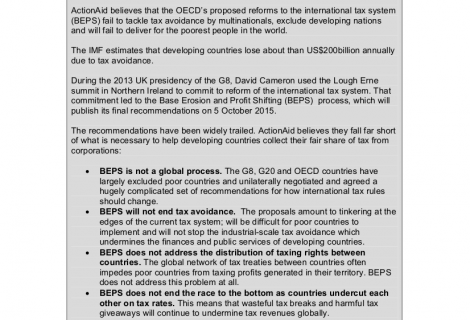
Patching up a broken tax system: Why BEPS is not the solution to poor countries’ tax problems
ActionAid believes that the OECD’s proposed reforms to the international tax system (BEPS) fail to tackle tax avoidance by multinationals, exclude developing nations and will fail to deliver for the poorest people in the world.
The IMF estimates that developing countries lose about than US$200billion annually due to tax avoidance.
During the 2013 UK presidency of the G8, David Cameron used the Lough Erne summit in Northern Ireland to commit to reform of the international tax system. That commitment led to the Base Erosion and Profit Shifting (BEPS) process, which will publish its final recommendations on 5 October 2015.
The recommendations have been widely trailed. ActionAid believes they fall far short of what is necessary to help developing countries collect their fair share of tax from corporations:
- BEPS is not a global process. The G8, G20 and OECD countries have largely excluded poor countries and unilaterally negotiated and agreed a hugely complicated set of recommendations for how international tax rules should change.
- BEPS will not end tax avoidance. The proposals amount to tinkering at the edges of the current tax system; will be difficult for poor countries to implement and will not stop the industrial-scale tax avoidance which undermines the finances and public services of developing countries.
- BEPS does not address the distribution of taxing rights between countries. The global network of tax treaties between countries often impedes poor countries from taxing profits generated in their territory. BEPS does not address this problem at all.
- BEPS does not end the race to the bottom as countries undercut each other on tax rates. This means that wasteful tax breaks and harmful tax giveaways will continue to undermine tax revenues globally.
To fix the global tax system, solutions beyond BEPS are needed. The OECD, a club of rich countries, cannot come up with those solutions. A more representative global body to decide on tax rules on tax is needed - a well-resourced and authoritative UN Tax Body should therefore be created with universal membership. Developing countries should review the way they grant tax breaks and negotiate tax treaties to ensure they don’t miss out on vital tax revenue. And if we are serious about ensuring that poor countries can raise tax revenue to fund their own development, then we need to address harmful tax competition. And that is one fight the BEPS process has no intentions of fighting.